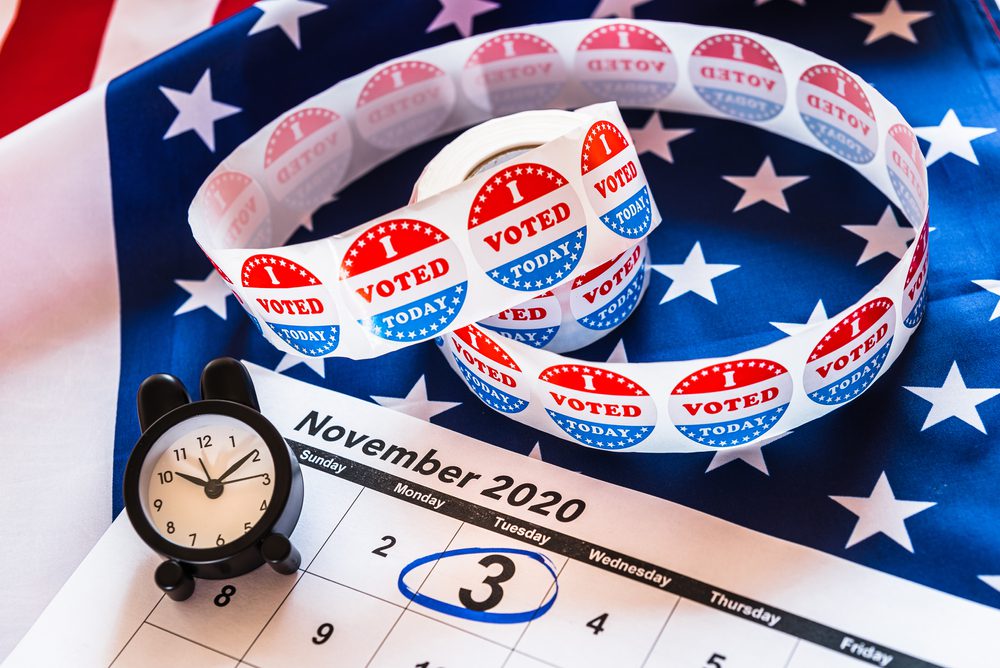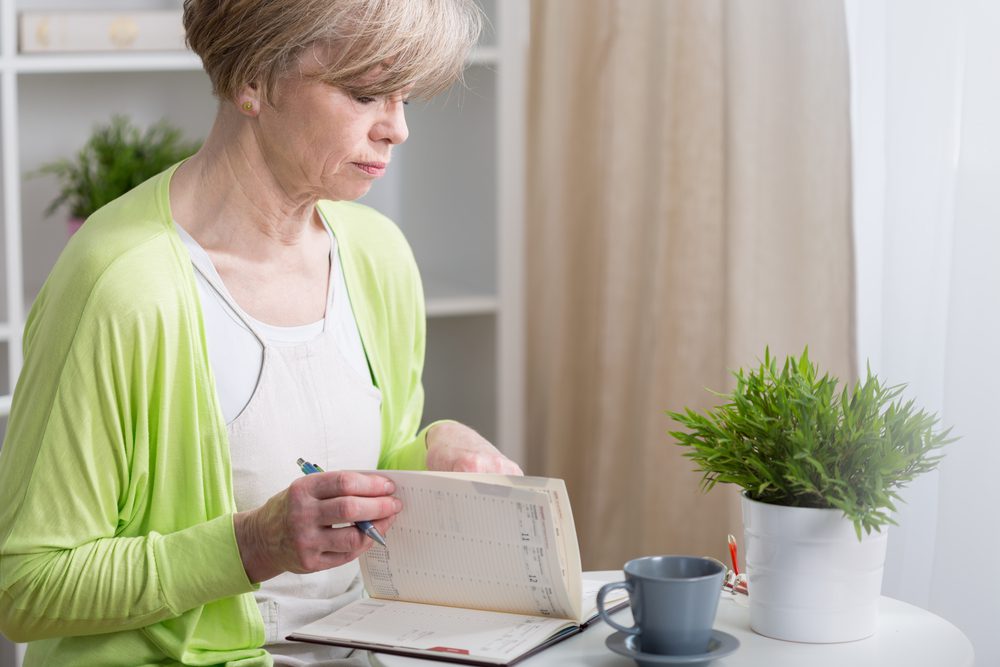
If the mere thought of November 3rd makes you break out in a cold sweat, you’re not the only one feeling this way. In fact, according to a survey conducted by the American Psychological Association at the end of 2019, 56 percent of adults in the United States claimed the upcoming presidential race is a source of major stress than the 2016 elections. Considering how 2020 has been going so far, the numbers might be even bigger if a new survey would be conducted.
“Normally, elections can cause some stress, but the stakes are higher this time around due to the polarized candidates, hurdles for voting, and the overall state of the country with the pandemic and racial tensions,” explains Dr. Sherry Benton, PhD, psychologist, founder and chief science officer of TAO Connect. This means feeling a bit stressed about the future of our nation is not something out of the ordinary. But if things seem to be spiraling out of control, here’s what therapists suggest we should do to cope with all the election stress and anxiety.
-
Limit your exposure to the news
Watching or reading the news in these times might have a surprising domino effect. Staying informed is always important, especially when it comes to your future, not to mention it is your civic duty, but it’s not alright to become fixated with everything that’s going on in the world, suggests Dr. Benton. Instead, she recommends limiting the time and amount of news you consume every day. Once you’ve reached that limit, turn off your TV or put your electronic devices away.
Another sign that it’s time to limit your intake of news is when you repeatedly read and obsess over the same information, says Rachel Gersten, licensed mental health counselor and co-founder of Viva Wellness. It’s not healthy, especially if what you read is something negative.
-
Try square breathing
If you constantly feel anxious and concerned about the election results and imagine the worst if things don’t go the way you want them to, take a step back and get a hold of yourself. “I’d say take a few deep, slow breaths and remind yourself that you aren’t in that place yet. Ground yourself in what you can do at this moment, on this day, to feel a little less crazed. You can worry about what might happen if or when it actually does,” says Gersten.
To relax and see things more calmly, and clearly, for that matter, try square breathing. This breathing technique involves breathing through your nose for four seconds, hold your breath for another four seconds, exhale through your mouth for a count of four, pause and hold for another four seconds. Do it until you start to calm down.

-
Write down your negative thoughts
If you’re finding it difficult to get rid of your catastrophic thoughts, an efficient method to detach yourself is to write them down. This will help you see things in a different perspective and discern between what’s a real concern and what’s not, says Dr. Benton. Once you start your scrutiny, the thoughts will not seem so realistic and worrisome. If your biggest fears seem well-founded and legit, remember that this country has been through so many difficult times like the civil war, the Great Depression, 9/11 and always managed to come back on top, suggests Dr. Benton. The same thing will happen after these elections.
See also Insults and Interruptions – What Did We Learn From the Presidential Debate.
-
Focus on what is within your control
“Anything that helps you feel in control and influential, like donating your time or money to political organizations or volunteering at a phone bank will help,” says Dr. Benton. The first thing you can do is google organizations that activate in the field that you’re interested in, like climate change or women running for office, and actually do something in that respect. They might need volunteers or financial support, and that’s where you can step in and lend a hand.
Another effective way to regain control over your thoughts and feelings and cope with election stress is to VOTE. This is the best action you could ever take that is completely under your control. One thing you do need to remember, though, is that although you vote, the final outcome of the elections does not depend entirely on you, warns Dr. Benton. But as long as you do your civic duty and feel at peace with your choice, you should be content and at peace with yourself.
-
Plan how to cope if the outcome is not the desired one
If you are concerned that you will feel the same way you did after the last election, Gersten suggests thinking of a plan to adapt to the situation now rather than later when you are already freaking out. Think about methods that would help you to cope with your feelings before and after November 3, especially if the result is not the one you wanted. Calling a friend on November 4 to discuss the whole thing, going to yoga classes to feel better and calmer, opting for some retail therapy, think of the things that would help you feel better. Whatever that is, come up with a plan, write it down and use it if you feel you need to.

-
Take a break from social media
With less than three weeks until the presidential elections, it’s not unusual to think that every Facebook post, tweet or Instagram story has a bit of politics in it. Seeing that everywhere might feel exhausting. In addition, social media can become the breeding ground for all sorts of fruitless debates and fake or misleading facts, says Dr. Benton.
If you’re feeling like there’s too much information and things become overwhelming, take a hiatus from social media. Stop scrolling, reading posts or whatever it is that you usually do to stay in the loop. If you notice that you always feel upset, disappointed or worried after going through the news feed on Facebook or you tend to look for new tweets every couple of minutes, just put your phone down and focus on something else. A more drastic approach, says Benton, would be to temporarily delete your social media accounts.
-
Come up with rules for talking politics with family or friends
If every conversation with your father ends up in a heated argument on healthcare reform that leaves you completely drained, come up with some basic rules for yourself and your loved ones. You might be family but politics has a sneaky way of disturbing even the most pleasant family dinner, especially when you don’t have the same political beliefs. Maybe it would be better to postpone discussing politics until after the elections, suggest Gersten. Or stick to in-person discussions instead of texting, which could lead to even more confusion and arguments.
Another way to cope with election stress is to avoid meeting up with people who trigger your political anxiety and don’t follow the rules for talking politics. It might seem far-fetched, but if it helps you feel relaxed and calm about November 3rd, then you have every right to do it.
-
Set your expectations for difficult conversations
If setting rules and boundaries is not enough, it’s time you set different expectations about the conversations you have with people, says Dr. Benton. You have to keep in mind that you cannot change the way someone thinks from one day to another, but you don’t even have to. If your next-door neighbor is unrelenting in believing all sorts of conspiracies, it’s not your responsibility to change his mind.
You might also be interested in reading Tribulations, Tax and Trump.

-
Join a digital support group
Joining a support group might help you find some sort of comfort and cope better with the stress and anxiety caused by the upcoming elections. “For some people, [joining a support group] can provide a sense of community. [You] can get suggestions and feedback from other people going through something similar,” says Gersten.
Due to the pandemic, attending meetings personally is not the safest option, but there are several online platforms which provide support for political anxiety and have online meetings once or twice a week, One such online support group has been launched by Coa, a therapy and mental fitness community. Their next meeting will take place on October 1 at 4 p.m. ET and chaired by San Francisco-based therapist Laura DeSantis, LPCC.
-
Work with a specialized therapist
Election stress can affect your life just like any other problem. Therefore, if you feel extremely concerned and stressed about November 3rd, don’t hesitate to talk to a therapist about your feelings and concerns. A professional can help you find methods to cope with your emotions and combat negative thoughts, says Dr. Benton.
Therapy can be useful especially if you have all sorts of disruptive political discussions with the very people you live with. The doctor’s cabinet can be a neuter space where you can talk freely about your political beliefs and related feelings.























